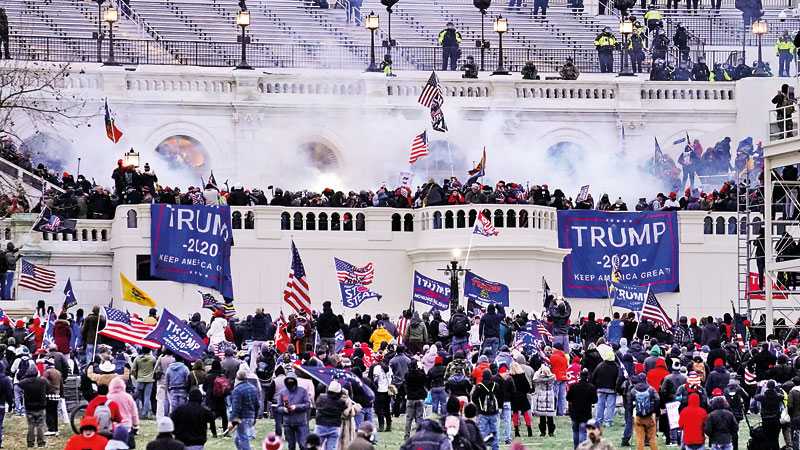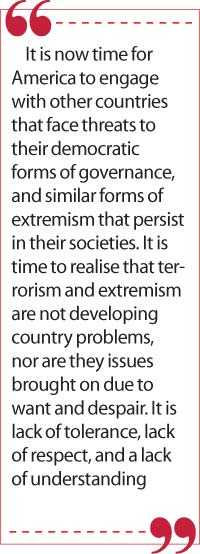Sunday Feb 15, 2026
Sunday Feb 15, 2026
Thursday, 14 January 2021 00:00 - - {{hitsCtrl.values.hits}}

A country seen to be at the top of the power ladder, economically surging ahead of the rest, financially the giant amongst other stalwarts, and the home of the Statue of Liberty was the location of the latest explosion of extremism
 The propagation of extremism, the political patronage it receives, and the fuelling of division in society by extremist elements and their actions, is the very antithesis of democracy and democratic principles. Extremist activities are said to have spawned in developing countries, or those that belong to the global south. It is often claimed that such countries are politically immature, possess insecure governance mechanisms, have denied their people liberties and are themselves to blame for the problems they encounter.
The propagation of extremism, the political patronage it receives, and the fuelling of division in society by extremist elements and their actions, is the very antithesis of democracy and democratic principles. Extremist activities are said to have spawned in developing countries, or those that belong to the global south. It is often claimed that such countries are politically immature, possess insecure governance mechanisms, have denied their people liberties and are themselves to blame for the problems they encounter.
Yet it was the United States of America, identified as a beacon of democracy that faced one of its greatest trials on 6 January, when the country walked a thin line. A country seen to be at the top of the power ladder, economically surging ahead of the rest, financially the giant amongst other stalwarts, and the home of the Statue of Liberty was the location of the latest explosion of extremism. Supremacy of one community, one party, and one individual remained the narcissistic magnet that galvanised anti-democratic forces and spurred them on. As these elements used violent means to break into the sacrosanct halls of democracy on Capitol Hill, while democratic values were being upheld in the chambers and the recognition of presidential transition was at play, questions have arisen:
Has democracy become a victim of itself?
Has the rise of extremism reached feverish levels?
Has the security apparatus failed?
 |
 |
Democracy
This day, 6 January 2021, could be the harbinger of a new form of democracy, which may be termed Extremist Democracy. This form goes beyond the sphere of radical democracy into territory wherein the achievement of an individual’s goals supersedes all else, and gives effect to freedom of the individual as the supreme form over all else. It is fanaticism taken to an extreme, with an individual, and in this scenario a President, who remained intolerant of the results of an election that pronounced his opponent the winner. The January Rebellion was borne out of democracy. It was a response to democracy. It was also an attack on democracy.
On 6 January 1941, American President Franklin D. Roosevelt stood in the US Congress and delivered his State of the Union Address highlighting the need to protect freedom in his iconic speech on ‘Four Freedoms’ wherein he talked about the need to protect universal freedom that all people possessed. Stressing the true value of democracy, he cautioned against the absence of freedom and the rampant effect it would have on America and the rest of the world. He was speaking at the beginning of a year which remains significant as the attack on Pearl Harbour in December 1941 drew the United States into the Second World War and heralded the position and platform that was created for that country from then to date.
Eighty years later another President, Donald J. Trump stood outside the White House and urged his supporters to use those very same freedoms that his predecessor had described and to march on Capitol Hill. While addressing the crowds he urged them to never give up their struggle to see him re-elected to the office of President. Trump stressed that “We will never give up. We will never concede. It will never happen. You don’t concede when there’s theft involved. Our country has had enough. We will not take it anymore.” Seen as a clarion call to his supporters, the words of the President were an encouragement of the masses, their attack on the halls of democracy and the death of people, as well as vandalism of state property and hours of carnage and destruction, all of which was beamed across the world. Has Roosevelt’s espousal of democracy resulted in society benefitting to the extent that it now formulates its own interpretation by taking it to an extreme? Here the essence of democracy has been submerged, and instead democracy has become a victim of itself.
Extremism
The notion that one’s own beliefs supersede all else, the lack of respect of the other, the inability to see the other for what they stand for rather than who they are, and the self-styled blinkers that restrict ones vision to anything else but what one wants everyone to see and know, has resulted in the rise, and spread of extremism in societies across the world. The recent rise of nationalism, wherein a ‘nation’ is identified to represent a community along narrow lines, rather than a country in a holistic manner, has seen the commitment of acts of violence, the taking of lives, and the destruction of property. The economic and financial impact is yet another arena which remains noteworthy.
At no stage of their actions do extremist elements reflect upon the damage they do to their cause and community. They fail to see the ramifications of their actions, and the deepening of prejudice against that which they espouse. It is this failure that leads to their subsequent downfall.
Since the attack on Pearl Harbour eighty years ago, the United States has always taken a high moral ground on human rights and values, their dissemination and their safeguarding in countless instances across scores of countries. The stance taken has been one in which those affected were asked to adhere to better and improved standards. They were questioned on their choice of policy and its implementation. They were sanctioned, reprimanded, identified at multilateral fora and accused of failing their people as a whole.
Yet today it is the United States that is a victim of extremism. It is America that needs the rhetoric to stop, that needs the healing, and most of all needs to respect diversity of view and vision. This has got to seep into a society that is determined to see it entrenched in other societies around the world. There is much work that the Biden administration would have to contend with. The absence of tolerance and the inability to move beyond tolerance into the realm of respect has driven the extremist elements in United States and in societies across the world to embrace violence to justify their own stance. Hence it is leaders who are called upon to act with strength of purpose and will, to do what is right by the general populace and the future of the country and not merely what is preferred by a segment.
The usage of violence to achieve ones goals is akin to the engagement in terrorism. Countries have experienced egoistic individuals, who utilised the grievances of peoples and communities to allegedly espouse causes but have done so through the means of terror. Such individuals, now relegated to history, identified violence as the means to their goals, and operated rigid mechanisms of violence but did so within democratic societies, and against democratically elected leaders and governments. What then is the difference between terrorist leaders who grab power through the might of the bullet, and democratically elected ones who, possessing the will of the ballot, choose, when faced with defeat, to resort to the same means as terrorist leaders?
Extremist elements have drawn countries into an abysmal hole. They have destroyed the fabric of society, pushed moderates to an extreme, and ensured the solidification of biases through their views and actions. The wrecking of havoc remains at the heart of their mandate, as they try to gain their objectives by any means possible irrespective of the impact their deeds have on themselves, their cause, and their communities. The Christchurch attacks in New Zealand and the Easter Sunday bombings in Sri Lanka are just two of the numerous incidents. Yet the divisions brought on by extremists increase the frequency and intensity of violent incidents and are today the bane of any society.
Security
Freedom is guaranteed as long as it is secured. Failure to secure it, results in its defeat and destruction. Whilst democracy remains value-based, and extremism is a form of radicalisation also based on beliefs, it is the security apparatus that needs to thwart and root out any form of threat to freedom. The inability to secure the most pivotal of democratic institutions in the world remains highly questionable. Capitol Hill has been the home of the US Senate and House of Representatives for over two centuries. It is the repository of democratic traditions and values that have been passed down for generations. How then could such a secure, pivotal building in the capital of the United States of America be infiltrated by marauding extremists, especially while sessions were ongoing, and sessions that were to consolidate the election victory of a President of America? Failure on the part of the security mechanism resulted in the carnage that was wrecked by extremist elements and ensured that 6 January 2021 entered the annals of history as another dark day for democracy and freedom.
An intensification of security has remained a critical concern for the United States when carried out in other countries. Those which have been victims of terrorism and extremism have resorted to a bolstering of security for purposes of defence and to prevent any form of threat to their societies. This has drawn the ire of America and her leaders on numerous occasions, which see such intensification as a direct attack on democracy. How will the United States now balance this apparent dichotomy? America, like other countries is today faced with the same security dilemma. Although this dilemma is relative it still remains a critical issue which demands immediate attention.
Roosevelt called for the safeguarding of democratic values. Presidents before him and after him have done the same. Trump himself has opted to toe the line at this late hour and has now called for a smooth transition having realised the futility of his demands and the mob approach. Thus the January Rebellion becomes the milestone at which America, other countries and most importantly their leaders realise the relevance of security and the need to thwart those who support and/or engage in terrorism and extremism in all forms and manifestations. The January Rebellion becomes the rationale for implementing the true meaning of democracy and learning to respect that which it espouses, so as to ensure that the freedom enshrined in a democracy doesn’t erode that which its attempts to safeguard.
This Rebellion is cry of warning to countries to remain vigilant at all times. Those who are determined to wreak havoc, kill people and go on the rampage, do so using the attributes that democracy affords them. Paying scant regard for the upholding of democratic values, they remain a cause for concern, but more significantly are a threat to the freedom of all. These are the instances in which democracy often becomes its own victim.
Future trajectory
On 6 January 1661, the Fifth Monarchists attempted to seize control of the city of London, but were unsuccessful. The extreme sect of the 17th century was determined to rid themselves of a leader, their King. The extreme sect of the 21st century is determined to ensure continuity of a leader, their President. In 2021 it is assumed that societies, communities and individuals have evolved, in their rationale, understanding and ability to comprehend the true essence of democracy. Whilst the January Rebellion highlighted the inability of some to evolve in just manner, it is also a moment of reckoning to all countries that times are changing.
It is not possible for countries like United States of America to take the high moral ground anymore. Extremism has been present in the past, is currently prevalent, and worryingly appears to continue to persist in the US in the future. This is not only an American problem, nor is it one that can be placed on a particular country, ideology or community. It is a collective issue that demands collective action. However for that action to be taken there has to be comprehension of the problem. Sauce for the goose remains sauce for the gander. Extremism in the United States, in New Zealand, in Sri Lanka or in any country on Earth is still extremism, and must not and cannot be condoned. Until all countries and their leaders realise this, we will continue to see extremism raging, terrorists resurging and democracy under threat.
It is now time for America to engage with other countries that face threats to their democratic forms of governance, and similar forms of extremism that persist in their societies. It is time to realise that terrorism and extremism are not developing country problems, nor are they issues brought on due to want and despair. It is lack of tolerance, lack of respect, and a lack of understanding.
The ensuing days and the action of American leaders will become pivotal to the position the country has enjoyed to date. Whether an impeachment is passed to remove Donald J. Trump days ahead of the end of his term and thereby bar him from running again, whether the extremists are quelled, or whether the security chiefs are changed on Capitol Hill and security in general is given a deeper degree of thought, all of this would depend on the actions taken in the days ahead.
Bi-partisan collective action within America and with the world is the need for the hour. If democracy is at the heart of governance, then democratic values have to be centred upon for decision making. It is time for collective realisation that challenges to democracy are common causes for concern and need to be addressed together, in a strong and coherent manner. They affect all countries and their democratically elected leadership and hence it is imperative that cooperative action, especially through multilateralism remains the arena of operation. It is thus an era of equality, as the challenges affect all, and need solutions from all, for all.
Donald J. Trump continuously campaigned on the slogan of ‘Make America Great Again’. Irrespective of the verdict on that call, what he has succeeded in doing is making America equal to all.